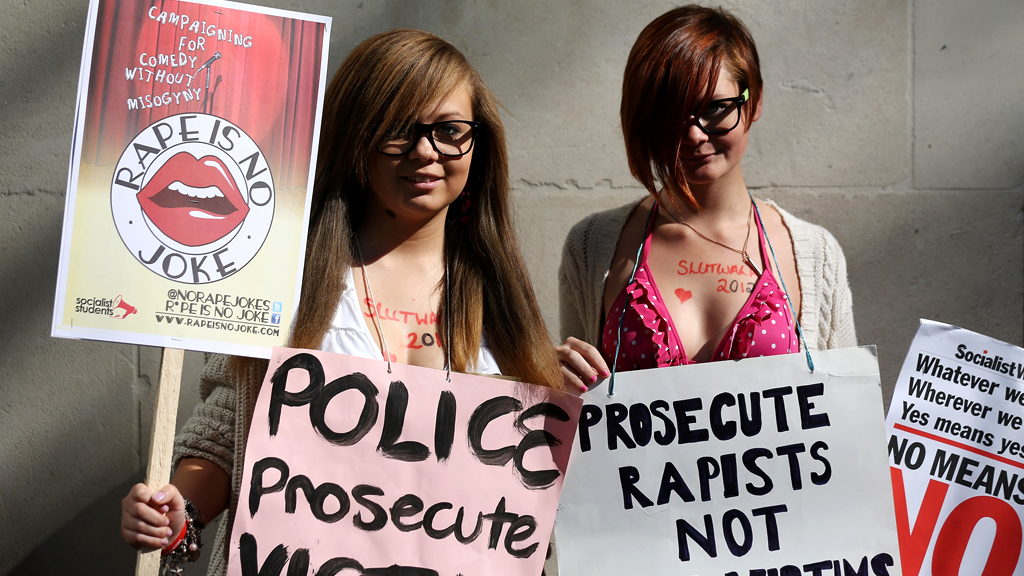Violence against women ‘part of everyday lives’ in UK
Amid growing protests about the gang rape and subsequent death of a young Indian woman in Delhi, rape campaigners tell Channel 4 News violence against women is endemic here in the UK too.

The story of the 23-year-old medical student, who died two weeks after she was gang-raped on 16 December, has spread like wildfire across the world and sparked protests in New Delhi.
In London, the women rights group Southall Black Sisters (SBS), is holding a protest on 7 January at the Indian High Commission – an event organised before Christmas, and before the world began to show such an interest. “We felt it was really important to show our solidarity with Indian feminists, with Indian women, and we felt that it was important to shame the Indian government into taking action,” Rahila Gupta, from the SBS management committee, told Channel 4 News.
The horrific death of ‘Damini’ has opened up the debate in India about violence against women – and crucially, how reported cases are dealt with by police and treated by society. Much has been made of the fact that there was just one conviction out of 635 rape cases reported to Delhi police between January and November last year.
In keeping with the international picture, the number of reported rapes is also thought to be a fraction of actual incidents – an estimated 10 per cent of rapes are reported in India.
VIDEO: Arundhati Roy speaks out against Indian rape culture
Violence against women ‘endemic’
UK conviction statistics are slightly better – but not by much: seven convictions result from every 100 reported cases of rape, while the total number of rapes or attempted rapes is thought to be 80,000, according to British Crime Survey statistics. One in seven (or 14 per cent) of women students have been the victim of serious sexual assault or physical violence.
“That’s what I find so frustrating about it,” Rape Crisis England and Wales trustee, Jo Wood told Channel 4 News. “Everyone’s appalled about what’s happened in India. But I want to tell people – this is happening next door, right here in the UK.”
Ms Gupta is keen to point out that violence against women in general is a universal problem. But she adds that the political and public response differs internationally, and in India, needs to be addressed.
“Violence against women is a way of controlling women’s behaviour and women’s sexuality,” Ms Gupta told Channel 4 News. “It is endemic and it happens across the world, and in that context, India should not be singled out. But the issue in India is about degree and the frequency of violence, and the fact that people can do this with impunity because we don’t implement the good laws that we do have.

Attitudes to rape
“There is an acceptance, or tolerance, of violence against women, that is so deeply embedded in our culture. Rape is more disapproved of because it affects the honour of the family, rather than the human rights of the woman. There will be condemnation, because family honour is besmirched.”
Attitudes towards women who are raped and the focus on the behaviour of women, rather than the men who carry out the crimes, still leave a lot to be desired in the UK. A third of respondents to an Amnesty International survey believed that women who flirt are partially responsible for being raped.
“That kind of view really needs to be questioned,” Sarah Green, the End Violence Against Women Coalition campaign manager, told Channel 4 News. “It means that we’re always interrogating women’s behaviour. It’s a very unchecked, unconsidered view. We’re never asking the question – why do men do it?”
The prevailing societal attitudes mean that victims of sexual violence – as the countless interviews of those abused by Jimmy Savile show – are still of the opinion that they won’t be believed if they report the crimes against them.
Casual sexism
The last few years have seen grassroots UK organisations springing up [pictured above right] to tackle common harassment and sexism: Hollaback, Everyday Sexism and Stop Street Harassment to name just a few. Women’s right campaigners have welcomed the movement, arguing that instances of casual sexism – from Page 3 models to the acceptance of sexualised insults at women in the street – are part of a spectrum, the most extreme of which is violence against women.
“That spectrum needs thinking about,” adds Ms Green, pointing out that sexual harassment is still not taken seriously by many UK police.
But while the campaigning carried out by grassroots organisations and campaign groups are encouraging, these attitudes are not shared by wider British society, Ms Green told Channel 4 News.
“It is more our mainstream political people and parties who are out of touch,” she said. “[Violence against women] is part of people’s everyday lives, and they want more discussion and policy to address it.”
-
Latest news
-
Ex-Trump lawyer Michael Cohen testifies at hush money trial3m

-
Racial hate speech laws being ‘weaponised’ warns National Black Police Association7m

-
‘Hard to believe so many women going through such horrors’, says woman whose baby daughter was stillborn8m

-
Damning report condemns ‘shockingly poor’ UK maternity services12m

-
People ‘expecting the West to stand by Georgia’, says opposition party leader5m

-




